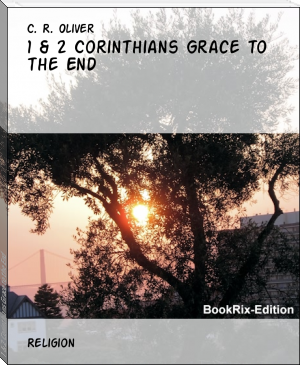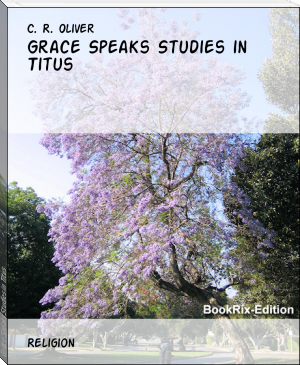author - "C. R. Oliver"

This study is designed to be the last of the series on Grace. Within its walls lies a desire to show the great scope of relevance Grace plays in the total walk of Holiness. Most of the references will be in the form of summaries to be used for further investigation by the reader. Also, the bulk of materials will be from the New Testament. However, select Scriptures found in the Old Testament will introduce this study by showing how grace appeared back in ancient days.

Deeper Grace is an on going study of Grace. This study is from the Book of Romans. The Jews knew that it was grace that chose Abraham and made him the father of their nation and the father of faith. Scripture and the prophetic word taught them their history was one of grace outpoured upon a special people of God.

We will steer our study over four chapters reviewing several of the enemies of Israel. Beginning with Babylon in Chapter 13, it is necessary to point out, not only the accuracy of the Prophet, but the long timeline. (Sometimes the prophet reaches into the future for over 100 years and is "on the money" historically. This prompts biblical critics to declare there are many Isaiah writers who voice their work in this book. Don't believe them.)

Grace is an active, live ingredient, not a passive covering. Grace is the equivalent of an umbilical between the heart of God and the heart of the spirit man. It nourishes, even when the people of God are unaware of its actions. Grace delivers the sufficiency to overcome evil and grow the inner man toward the stature of Christ. Grace, however, refuses the company of the three confrontations Paul made with the Corinthian church: immorality, division and judgmental Pharisee-ism. Grace is never a

For the first study of the New Year 2013 and continuing the series on Grace, our focus will be based on three passages in Paul's epistle to Titus. In these three passages, the reader will learn that the "Grace" Paul talks about in his salutary remarks is greater in dimension than what is held in common concepts today. He greatly refines his reader's understanding in the second and third passages of this discussion. Incorporating all the aspects addressed in Chapters 2 and 3, his

Isaiah is the great "Re-introducer of God." In profound language, both in prose and poetry, he addresses a nation that had "forgotten with Whom they were dealing." In today's study of the first five chapters, there builds a crescendo of interaction between God and His people that will culminate in the wonderful sixth chapter.

It is easy to forget, in these closing chapters of Isaiah, that God is re-introducing Himself to His people. Along with these passages is an ever increasing refinement of what He considers as important and just how He plans to intervene in history. The Lord shows the tender side of His Fatherhood, as well as, the power side of His authority.

This study is designed to be the last of the series on Grace. Within its walls lies a desire to show the great scope of relevance Grace plays in the total walk of Holiness. Most of the references will be in the form of summaries to be used for further investigation by the reader. Also, the bulk of materials will be from the New Testament. However, select Scriptures found in the Old Testament will introduce this study by showing how grace appeared back in ancient days.

Deeper Grace is an on going study of Grace. This study is from the Book of Romans. The Jews knew that it was grace that chose Abraham and made him the father of their nation and the father of faith. Scripture and the prophetic word taught them their history was one of grace outpoured upon a special people of God.

We will steer our study over four chapters reviewing several of the enemies of Israel. Beginning with Babylon in Chapter 13, it is necessary to point out, not only the accuracy of the Prophet, but the long timeline. (Sometimes the prophet reaches into the future for over 100 years and is "on the money" historically. This prompts biblical critics to declare there are many Isaiah writers who voice their work in this book. Don't believe them.)

Grace is an active, live ingredient, not a passive covering. Grace is the equivalent of an umbilical between the heart of God and the heart of the spirit man. It nourishes, even when the people of God are unaware of its actions. Grace delivers the sufficiency to overcome evil and grow the inner man toward the stature of Christ. Grace, however, refuses the company of the three confrontations Paul made with the Corinthian church: immorality, division and judgmental Pharisee-ism. Grace is never a

For the first study of the New Year 2013 and continuing the series on Grace, our focus will be based on three passages in Paul's epistle to Titus. In these three passages, the reader will learn that the "Grace" Paul talks about in his salutary remarks is greater in dimension than what is held in common concepts today. He greatly refines his reader's understanding in the second and third passages of this discussion. Incorporating all the aspects addressed in Chapters 2 and 3, his

Isaiah is the great "Re-introducer of God." In profound language, both in prose and poetry, he addresses a nation that had "forgotten with Whom they were dealing." In today's study of the first five chapters, there builds a crescendo of interaction between God and His people that will culminate in the wonderful sixth chapter.

It is easy to forget, in these closing chapters of Isaiah, that God is re-introducing Himself to His people. Along with these passages is an ever increasing refinement of what He considers as important and just how He plans to intervene in history. The Lord shows the tender side of His Fatherhood, as well as, the power side of His authority.


